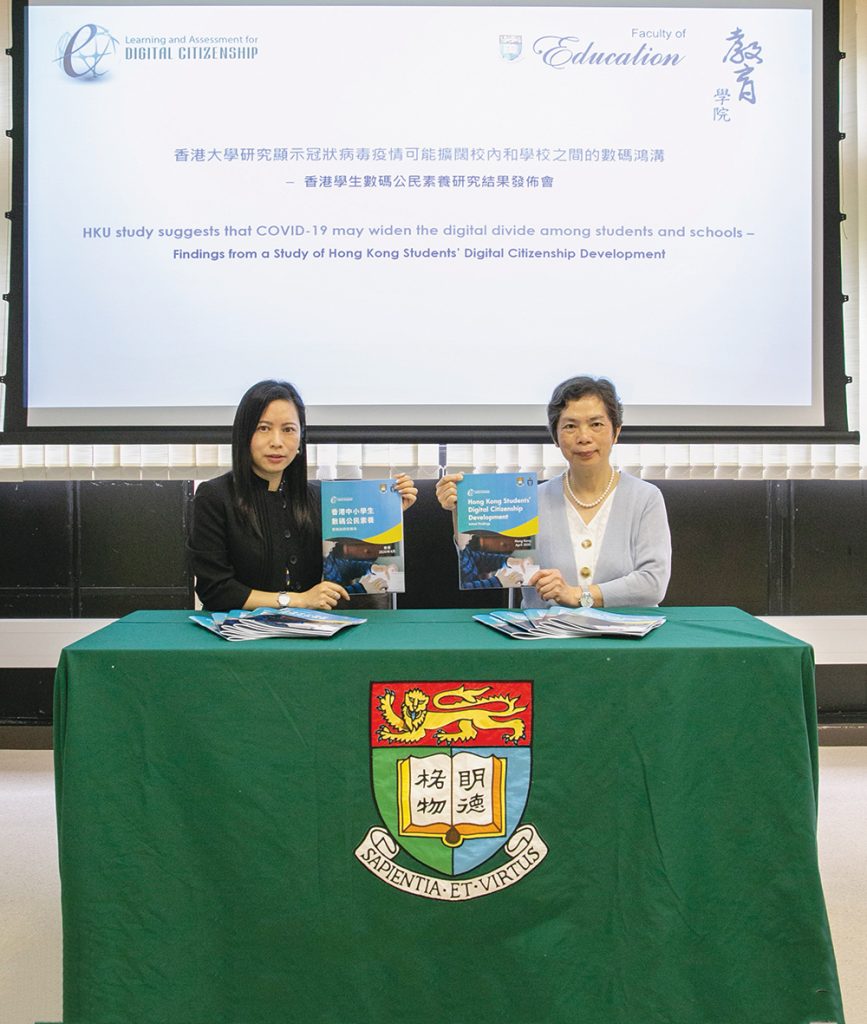November 2020 | Volume 22 No. 1
Mind the Gap
Professor Nancy Law, Deputy Director of the Centre for Information Technology in Education, is leading an interdisciplinary team in a five-year longitudinal study – Hong Kong Students’ Digital Citizenship Development. The first wave of results has shown up serious differences in students’ digital abilities, both within and across primary and secondary schools in Hong Kong. The report’s findings had only just been published earlier this year when the COVID-19 outbreak became a pandemic and schools across Hong Kong were suspended.
“We had no idea that the course of events locally and globally would have changed so drastically as to push digital citizenship issues to the forefront,” said Professor Law. With COVID-19 closures rapidly overtaking events, Professor Law and Dr Tan Cheng Yong, from the Academic Unit of Social Contexts and Policies of Education, embarked on the eCitizen Education 360 study between June and July this year, when schools briefly reopened, giving them the chance to see how schools had coped. The new study was supported by 1,200 teachers, 1,300 parents and 6,000 students from primary, secondary and special schools.
Given the initial results of the first project, it is perhaps ironic that the consequence of COVID-19 has not all been negative since it has forced all schools and teachers to take some action towards using digital, online means to carry out their educational functions. “We have seen great leaps in the digital competence of students and teachers alike, and the adoption of new tools and digital pedagogy by teachers,” said Professor Law.
Conversely, several serious challenges have emerged from this sudden switch to a totally online provision of education.
“The levels of school preparedness for using technology to provide online learning and teaching are hugely diverse. Students who are studying in unprepared schools are very much disadvantaged. In fact, we found that there were huge digital competence divides across schools before the pandemic, and this is likely to be associated with the level of preparedness for e-learning when the pandemic hit. If this situation is not addressed, the disadvantage brought to students in unprepared schools will only increase.”

Findings from the study of Hong Kong Students’ Digital Citizenship Development suggest that COVID-19 may widen the digital divide among students and schools.
Social economic status
The digital divide (in terms of digital competence, access and family support) that the Digital Citizenship study revealed before COVID-19, is often associated with social economic status (SES) divides. “These cannot be addressed simply by ensuring that all students have adequate access to large-screen devices and internet connectivity,” said Professor Law.
“Low SES students may not be able to overcome the competence divide to make use of the technology for online learning. They also may not have a quiet place to take part in online learning. This is also why we used ‘360’ in the title of our new project – to address these issues we need all-round multi-sector engagement from the community.”
This raises the question of what can be done next, given that COVID-19 seems likely to be here for some time. Professor Law believes that schools need to develop a comprehensive e-learning strategic plan that includes the capability to conduct fully online and blended learning for students to maximise the educational benefits of digital means of learning both during times of social distancing and when that is not necessary. This includes the setting up of appropriate information and communications technology infrastructure in the school to support online and blended teaching and learning.
“They should also take steps to identify students in need of help. There is an urgent need to provide technology access and accompanying support,” said Professor Law. “Partnerships should be forged between schools and community organisations to bridge these gaps.”

The study shows that a majority of the students in all cohorts had access to desktop computers, laptops and tablets at home, but most of them had to share these devices with others.
Discriminating power
An unexpected finding from the eCitizen Education 360 study was what Professor Law describes as “the discriminating power of one indicator” – where a school’s decision to participate in a Bring Your Own Device (BYOD) scheme appears to have triggered other school-level actions that improved their preparedness for online teaching and learning. For those schools that had BYOD in place, the online teaching and learning experiences of the students, teachers and school leaders were more positive than those that did not. “We also found that the students’ and teachers’ reported gains in digital competence during the school suspension period were higher for those in schools with a BYOD programme, and they experienced less anxiety when school resumed after suspension,” said Professor Law.
We found that there were huge digital competence divides across schools before the pandemic, and this is likely to be associated with the level of preparedness for e-learning when the pandemic hit. If this situation is not addressed, the disadvantage brought to students in unprepared schools will only increase.

PROFESSOR NANCY LAW
UPCOMING REPORTS FROM eCITIZEN EDUCATION 360
The first batches of results from the study were published in July and August, and Professor Law and Dr Tan plan to release four further research bulletins about different aspects of the data, namely: teachers’ online pedagogies and challenges; implications for professional learning school leadership; preparing for agile transitions and integration of online, blended and offline learning; emotions and stress in adversity: building the resilience of schools and communities; and building a comprehensive connected learning support network for quality education and digital citizenship.

